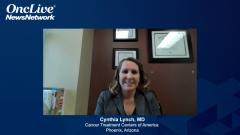
HER2+ mBC: Sequencing Novel Treatment Regimens
In the context of recently approved novel regimens, expert Cynthia Lynch, MD, revisits the optimal sequencing of therapy for patients with HER2+ metastatic breast cancer.
Episodes in this series

Transcript:
Cynthia Lynch, MD: When I'm looking at a patient with HER2+ metastatic breast cancer, the way I would consider usage of drugs and how I might sequence them is as follows. For someone who is in the first-line, I think that's pretty clear: the NCCN [National Comprehensive Cancer Network] guidelines recommend the use of pertuzumab, trastuzumab, and a taxane. Again, that can be docetaxel or paclitaxel in combination with that. In general, those agents are continued until disease progression with the exception of the cytotoxic agent, which is typically dropped off after 6 cycles as long as patient is responding well. In the second-line setting, based on the DESTINY trial, the use of trastuzumab deruxtecan has moved up to the preferred drug for second-line therapy. Again, that is based on both efficacy and noting that it overall has a very good safety profile. Previously, I had mentioned that there are a few adverse drug effects that need to be managed well and that oncologists need to be aware of. I would say that is the risk of nausea, vomiting as well as the risk of pneumonitis in the interstitial lung disease, but with close monitoring of patients that can be administered very safely. Trastuzumab emtansine or T-DM1 also, which had previously been the preferred second-line agent, still is an option in the second-line therapy, but for many oncologists that is probably moving more down into the third-line of therapy beyond trastuzumab deruxtecan with trastuzumab deruxtecan as well. We've seen it with all different types of combinations, but I think both of those drugs have demonstrated ability to show a response for intracranial metastases. Then when I look beyond that, I'm usually giving consideration to sequencing trastuzumab or margetuximab in combination with different chemotherapy agents. Usually, I'm partnering it with all of the similar agents that we use for women who don't have HER2+ breast cancer, but that's drugs like gemcitabine, vinorelbine, eribulin looking at those in combination with the trastuzumab. Basing that on those women at that point have had several prior lines of chemotherapy and so giving consideration to what things are important to them as far as side effects, maybe looking at prior side effects that are still persistent like neuropathy and those types of things would help me choose what drugs I would be considering for further lines of therapy.
Transcript edited for clarity.







































